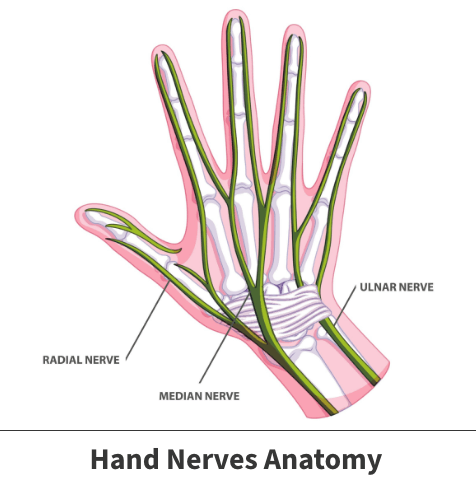Hand nerve decompression
People use their hands anywhere from 200 to 600 times per day. Your hands are not only used to perform basic tasks, such as gripping, grasping, and lifting objects, but also to express feelings and emotions.
Your hands can be subjected to a whole host of conditions. One specific issue is nerve damage. Fortunately, a surgical procedure called hand nerve decompression can ease this painful and debilitating problem.
Anatomy

Besides many bones, muscles, soft tissues, and blood vessels, the hand contains several key nerves. Nerves carry important messages from the brain and nervous system to the rest of the body and back. These messages help the body perform essential functions.
Three primary nerves are found inside the hand; the median, ulnar, and radial. They play a critical part in helping your hands complete movements and feel sensations, such as pain and temperature extremes.
- Median – This nerve is responsible for supplying the feeling you experience in most of your fingers and your palm. Moreover, the median nerve sends messages to your thenar muscles, which allow you to move your thumb backward, plus lifting and grasping items.
- Radial – The radial nerve and individual extensions enable you to extend your fingers and raise your hand. Furthermore, this nerve supplies the feeling in the back of your hand near the thumb.
- Ulnar – This nerve provides the feeling you have in several fingers. Additionally, the ulnar nerve permits you to move your fingers apart, bend your fingers from the knuckles down, and move your thumb back towards your hand. Damage to the ulnar nerve makes it difficult to grip or grasp objects.
About
Should these nerves become injured or diseased, your ability to pick up objects, perform basic tasks, or possibly even move your hands is challenged. One specific circumstance is compression, caused by excessive pressure or force being placed on the nerve in question. Hand nerve decompression is performed to ease this pressure.
Causes for nerve compression
Compression can occur for several reasons. One common factor is traumatic injury. A severe event, such as an automobile accident or a fall could result in broken bones or soft tissue injuries that might place undue strain on affected nerves in your hand.
Another common cause is overuse. If you are employed in a job that requires you to hold objects for extended durations or continually bend your fingers, hands, and wrists in unusual positions, you stand at increased risk of developing nerve compression.
That said, several other issues could lead to compression syndrome, such as nerve-damaging illnesses, like diabetes, cancer, high blood pressure, obesity, various autoimmune diseases, and congenital disabilities.

Symptoms
Specific physical symptoms will depend upon the particular location of the compression and its severity. But you might experience symptoms, including:
- Swelling
- Redness around the affected area
- Numbness or tingling in the fingers
- Difficulty moving your fingers or hand
- The inability to grasp or lift objects
- Pain in the impacted area
Additionally, you might be at risk for developing nerve compression if you are over age 30, female, employed in a job requiring repetitive finger and hand movements, such as those who use computers or perform heavy physical labor over long periods.
Diagnosis
If your Florida Orthopaedic Institute physician believes you might have hand-related nerve compression, they will first ask about your employment and health histories, in addition to your symptoms.
Once this step is complete, they may order further diagnostic and imaging tests. These can include nerve function examinations and blood tests to rule out specific illnesses. Imaging tools, such as magnetic resonance imaging (MRI scans), allow your doctor to take a closer look at your hand’s inner workings.
Treatment
In less severe instances, surgery might not be necessary. Decompression procedures are typically the most direct way to reduce pain and other associated symptoms.
Nonsurgical treatment options
Sometimes, you might find relief of mild to relatively moderate cases of hand nerve decompression by altering lifestyle habits, such as changing job responsibilities or identifying more efficient and less strenuous methods of performing your work. Occupational therapists can help you find ways of doing your job without overtaxing your fingers, palms, and wrists.
Mild occurrences can be improved with specific medications. Drugs used to relieve mild decompressions symptoms include over-the-counter non-steroidal anti-inflammatory drugs (sometimes abbreviated as NSAIDs) such as Advil, Motrin (ibuprofen) and Aleve (naproxen) help reduce swelling and pain. Prescription corticosteroids are also used.
Surgical intervention
Most moderate to severe compression cases caused by years of overuse, significant injury, or severe disease often need decompression surgery.
The best candidates for surgery
Experiencing pain and other symptoms does not necessarily make you a good candidate for surgery. That said, your physician might recommend this form of treatment if you:
- Have experienced severe pain for at least three months
- Have tried other options
- Began experiencing pain following a traumatic event
- Have been diagnosed with a nerve-damaging disease
The decision to undergo surgery should not be made lightly. You and your doctor will weigh the pros and cons and make an informed decision together.
The procedure
In most instances, hand decompression surgery is performed to ease the stress on the nerve. Your surgeon will make an incision around the affected part of the nerve and reduce the associated pressure.
Recovery
Trying to pinpoint a specific recovery period is difficult. Several factors play into your recovery time, such as how long the nerve was compressed, the compression’s severity, and the circumstances that led to the injury. That said, full recuperation can take anywhere from a few weeks to several months and often requires undergoing a course of physical therapy.
For the most part, orthopedic specialists agree that most recipients experience a noticeable reduction in symptoms and regain a substantial portion of the movement.
Related specialties
- Basal Joint Surgery
- Carpal Tunnel Syndrome
- De Quervain's Tenosynovitis
- Dislocated Finger
- Distal Radius Fracture (Broken Wrist)
- Dupuytren’s Disease
- Flexor Tendonitis
- Fractured Fingers
- Functional Nerve Transfers of the Hand
- Ganglion Cysts
- Hand & Finger Replantation
- Hand Skin Grafts
- Nerve Pain
- Peripheral Nerve Surgery (Hand) Revision
- Revascularization of the Hand
- Rheumatoid Arthritis of the Hand
- Sports Wrist & Hand Injuries
- Sprained Wrist
- Sudden Acute Finger, Hand & Wrist Injuries
- Targeted Muscle Reinnervation (TMR)
- Tendon Transfers of the Hand
- Thumb Ulnar Collateral Ligament Injuries
- Trigger Finger
- Ulnar Neuritis
- WALANT (Wide Awake Local Anesthesia No Tourniquet)
- Wrist Arthroscopy
- Wrist Fractures
- Wrist Tendonitis
